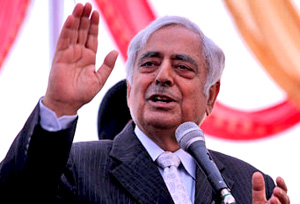Srinagar, Dec 25: As the deadlock over government formation in Jammu and Kashmir continued, the state unit of Congress today backed PDP patron Mufti Mohammad Sayeed to lead the new dispensation to respect the people's verdict in the just-concluded Assembly elections.
"It is a worrying situation in which certain power-hungry political groups and individuals are trying to subvert the democratic verdict of the people in the just-concluded election to the state Legislative Assembly," JKPCC president Saifuddin Soz said in a statement here.
He further said, "a suave, experienced and forward-looking politician like Sayeed should be allowed to lead a coalition government in the state with the support of other like-minded parties or groups. That way alone the people's verdict would truly be respected."
Soz was apparently referring to the reported meeting between BJP and National Conference leadership, a development denied by BJP General Secretary Ram Madhav.
"News about BJP leaders meeting NC leadership in Delhi is baseless," Madhav wrote on micro-blogging website Twitter.
National Conference working president and outgoing Chief Minister Omar Abdullah re-tweeted Madhav's tweet.
Earlier, Omar said he had not cancelled or postponed his visit to England where his parents Farooq Abdullah and Molie are recovering from an organ transplant surgery.
"I don't want to spoil a good story but I haven't cancelled or postponed my trip to England. I was always booked on the 27th of December," Omar said.
Soz said Jammu and Kashmir has experienced blackest periods of its recent history through armed militancy and devastating floods that left thousands of people homeless and needy.
"It is a time when a government should be at the helm to reconstruct the economy, rehabilitate a suffering mass of people and ensure governance that brings relief in the hearts and minds of the people," he said.
The state Congress Chief said the RSS-BJP leadership would be well-advised to resist the temptation of cobbling a coalition that "only deepens the polarisation on religious and regional considerations, which is, to say the least, detrimental to the integrity of the State."
"The RSS-BJP leadership should also appreciate the sensitivity of this border State and not indulge in any kind of horse-trading, giving priority to the parochial interests. That kind of short-sighted political arrangement would certainly attract a Social Commotion and spoil the gains from a credible, free and fair Election concluded recently," Soz said in the statement.






Comments
Add new comment